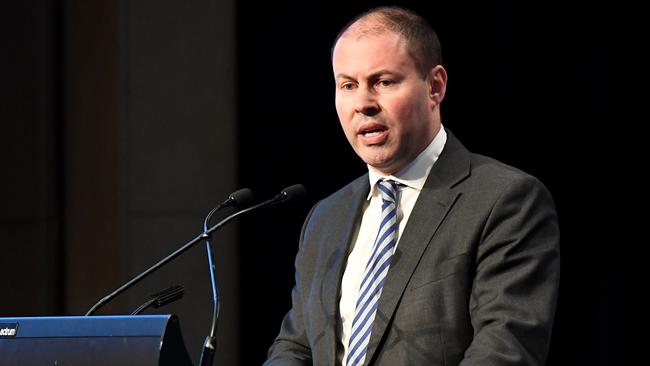Govt blitz on hidden power gouges
Power companies will be forced to overhaul their pricing plans as the Turnbull government drafts new rules.

Power companies will be forced to overhaul their pricing plans as the Turnbull government drafts new rules to give households more scope to cut their electricity bills, amid fears customers are being charged $1500 more than needed on some contracts.
Malcolm Turnbull will put company chiefs on notice today to prepare for tougher electricity market rules, as government officials canvass changes that would require retailers to reveal more of their price changes to customers.
Writing in The Australian today, Energy Minister Josh Frydenberg warns of “ridiculous” situations where “loyal customers are left languishing” because companies have no obligation to let them know when their prices rise.
“As the rules currently stand, retailers are not obliged to inform customers when their discount period ends if their contract is ongoing,” Mr Frydenberg writes.
“This should change, as customers deserve to know not only when the bill is changing, but by how much.”
The government estimates that half of all electricity customers are on contracts that offer a low-price period but place no requirement on the company to reveal when the discounts end and the prices soar.
The issue is turning into a flashpoint with the industry as the government vows to do more to ease the pressure on power prices, following a move to impose export limits on gas companies to boost local supplies.
The government has advice that shows there were 1178 residential market electricity offers available on the east coast early this month on its Energy Made Easy comparison service.
More than half of these gave retailers full scope to vary their prices with little or no notice.
The Prime Minister will try to shift his agenda to energy affordability after yesterday sealing a Coalition agreement on a “people’s vote” to decide same-sex marriage, as the government struggles in the polls and attempts to assure voters it is acting on cost-of-living issues.
The government is preparing to call in the Australian Competition & Consumer Commission if needed to force disclosure from power companies, as the market watchdog investigates the retail market and its profit margins.
According to independent estimates, the gap between the best and worst contracts on offer can range from $900 to $1500, signalling the size of the gains to households under better rules.
“Too many families are not on the best power deal they are entitled to,” Mr Turnbull said in a statement last night.
“A significant number of customers remain on standing offers, or market offers with expired benefit periods — potentially more than half of all customers. We are particularly concerned that many of those customers are the people least able to afford paying more.
“This situation must be addressed — urgently and directly. We do not want households to pay one cent more than they have to.”
Bill Shorten has accused Mr Turnbull of making “excuses” for not being able to bring down energy prices, as the wider debate over energy and climate policy turns towards a fight over retail prices.
The Opposition Leader said Mr Turnbull had a “shoulder-shrugging style” that said to voters: “What do you expect me to do about it? I’m only the Prime Minister.”
The Coalition remains divided over long-term energy policy. Former prime minister Tony Abbott has called for a freeze of the Renewable Energy Target ahead of a decision on whether to adopt a clean energy target recommended by commonwealth Chief Scientist Alan Finkel.
Today’s meeting will include Mr Turnbull and Mr Frydenberg, Energy Australia’s Catherine Tanna, Origin Energy’s Frank Calabria, AGL’s Andy Vesey, Snowy Hydro’s Paul Broad, Momentum Energy’s Paul Geason, Alinta Energy’s Jeff Dimey, Simply Energy’s Carly Wishart and the Australian Energy Council’s Matthew Warren.
Mr Warren said last week the industry welcomed the meeting as a chance to discuss government regulations that created uncertainty and drove up prices.
“We think the cost of energy in Australia is too high and we have to fix that,” Mr Warren said. “The crisis we have now has been a decade in the making, a decade of political uncertainty.”
Kerry Schott, who will chair the Energy Security Board established by the Council of Australian Governments’ energy council, told The Australian yesterday the introduction of the Finkel reforms would take about three years — although some could be implemented sooner.
Dr Schott said the key challenge was to manage the transition to renewables while keeping a close eye over power prices.
“We’ve really been reliant on coal for a long time,” she said. “The percentage of renewables is going up so dealing with that new world is really quite pressing.”
Dr Schott argued that coal would remain a major part of the energy mix, adding that there was no country that could “run an electricity market without some synchronous energy which is either coal or gas or something of that nature”.
Dr Schott’s deputy chair, Clare Savage, said the Finkel review had consulted widely in devising its recommendations and the ESB would work to ensure they were implemented to ensure Australia had a secure, reliable and affordable energy system into the future.
The ESB was one of the recommendations in the Finkel Review. It suggested the ESB provide an inaugural report on the “health” of the national energy market to the COAG energy council by the end of the year.


